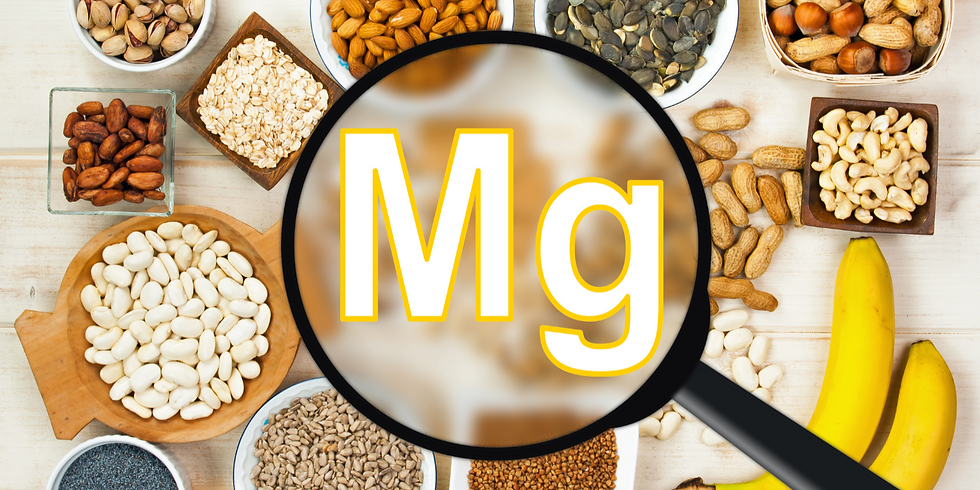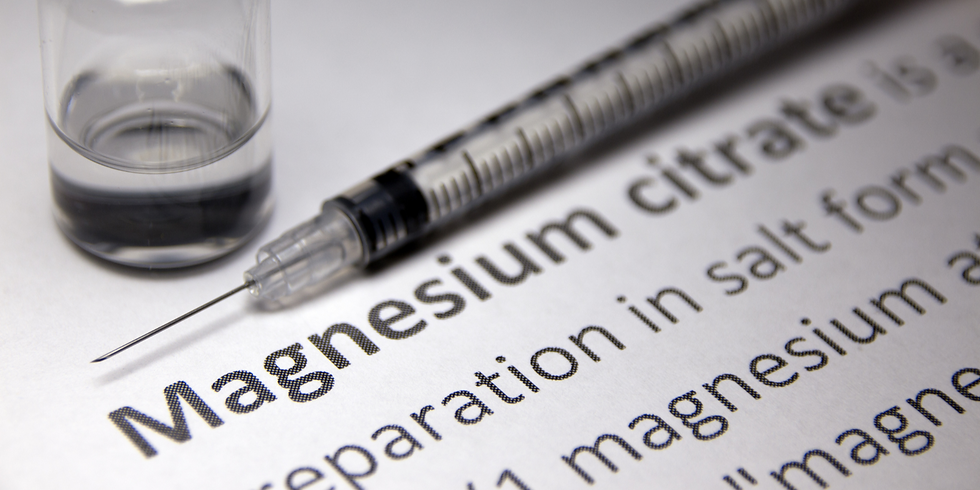3 Nutrients For Anxiety
- Ashley Oswald, RDN, IFNCP, CNSC, CLT, LD

- Jan 30, 2022
- 4 min read
Updated: Nov 28, 2023
3 Nutrients For Anxiety
Video Transcript:
Hi everybody and welcome back to our blog.
Today we're going to be talking about what nutrients can actually contribute to or cause anxiety.
A lot of people are getting diagnosed with anxiety and depression, and often, they're not being told about nutritional ways that can actually significantly help to improve these struggles.
And so today I really want to hone into three specific nutrients to make it more absorbable and easy.
At the end, I'm going to share some other considerations for possible contributory root causes to anxiety.
3 Nutrients For Anxiety
Low Magnesium causes Anxiety

The first one I want to talk about is magnesium.
It's estimated that about 70% of individuals have low storage of magnesium, and there are many possible reasons for this:
First of all, our soils are becoming more and more depleted of different minerals.
Secondly, during periods of excessive chronic stress, our body uses up more magnesium.
Thirdly, certain medications like birth control can contribute to deficiencies in magnesium.
Fourthly, most people simply do not eat enough magnesium-rich foods. A great source of magnesium is pumpkin seeds. So if you like pumpkin seeds, I'd encourage you to have a handful of pumpkin seeds, at least every few days, or maybe every day for a while.
So not only can magnesium help with anxiety but it can also help with sleep.
Improved sleep, could be the main reason it can help with anxiety. Because certainly if you're sleeping better, you're going to feel better the next day.
For most people, adding a magnesium supplement is likely safe, and can be a way to see if it actually is going to help.
For most people, it's safe to start with 200 to 400 milligrams of magnesium glycinate, a well-absorbed form, per day before bed, and after a week or two, seeing if you noticed benefits. Here is a good quality option: https://flussonutrients.nutridyn.com/magnesium-glycinate
And to note, if you're taking or about to take magnesium citrate, just know that it won't be as well absorbed, and can cause loose stool. So this would be okay to take if you struggling with constipation, otherwise, shoot for that magnesium glycinate.
Magnesium Citrate (if you struggle with constipation too): https://flussonutrients.nutridyn.com/magnesium-citrate
Lack of Vitamin D Causes Anxiety?

The number two nutrient I want to talk about that has been shown to help with anxiety, is Vitamin D.
So you've probably heard about vitamin D for mood and for depression, especially seasonal depression.
Did you know that low Vitamin D is linked to anxiety? And we know that using 1500 IU per day can significantly improve depression as well.
And we all know that depression and anxiety can commonly go hand in hand, and low Vitamin D is really common after the winter months because in many places in the world, we can not absorb Vitamin D during winter.
For example, in Minnesota, even though the sun might pop out during winter, we cannot absorb vitamin D between Memorial Day and Labor Day.
So what should you do?
Get your Vitamin D levels tested. Here is one option: https://flussonutrients.nutridyn.com/vitamin-d-test
Go on vacation somewhere closer to the equator, where you can absorb some vitamin D from the sun!
Consider using a Spectra Sperti sun lamp to get Vitamin D during the winter: https://www.sperti.com/product/sperti-vitamin-d-light-box/
Consider a supplement of 2,000 IU daily (more if your labs shows deficiency!): https://flussonutrients.nutridyn.com/catalog/product/view/id/1922/s/d3-5000-with-k2/category/3/ & higher dose for if needing to replace a deficiency: https://flussonutrients.nutridyn.com/catalog/product/view/id/2017/s/d3-10-000-with-k2-2017/category/3/
Learn more about Vitamin D Here: https://www.flussonutrients.com/post/vitamin-d-why-is-it-an-essential-nutrient
B Vitamin Deficiency and Anxiety

The next vitamins I want to talk about are the B vitamins.
Research shows B vitamins can help with anxiety, and the research goes back to the 1940s before a lot of foods in the United States started to get fortified with B vitamins.
And one of particular interest is vitamin B6. Birth control can actually cause a deficiency of vitamin B6, so if you're a woman on birth control and you're experiencing anxiety, this would be something to look into, because it might be that that medication is causing you to have a low Vitamin B6 store. And that can be at least one component of why you might be experiencing anxiety.
Trialing a B complex, to see if this helps your anxiety, is safe for most people (but always check with your supplement/nutrition-literate provider as no one supplement is safe for everyone).
Here is a high quality B complex option: https://flussonutrients.nutridyn.com/b-complex
Further, research showed that taking a multivitamin with minerals, significantly improved anxiety and adult males. And it might be because of the B vitamins that they're getting from that multivitamin.
For most people, it's going to be low risk to either trial a multivitamin or trial a B complex, and just see if you feel better or see if it helps the anxiety.
Here are a few high quality professional multivitamin with minerals options:
MVI Powder: https://flussonutrients.nutridyn.com/dynamic-multi-powder
Children's Chewable: https://flussonutrients.nutridyn.com/suppys-multi-vitamin-1964
MVI with Iron: https://flussonutrients.nutridyn.com/essential-multi-with-iron
MVI without Iron: https://flussonutrients.nutridyn.com/essential-multi
Certainly, you can do micronutrient testing as well, where we test the micronutrients in the white blood cells. Just reach out to our sister company, Oswald Digestive Clinic, if you're interested in this.
So in summary, the 3 nutrients that can contribute to anxiety include magnesium, vitamin D, and then the B vitamins!
And I now want to share with you some more possible root causes for anxiety as promised.
Some other possible root causes for anxiety include hormone imbalance, which could be an imbalance of DHEA and estrogen, and progesterone.
And anxiety could also be from an imbalance of insulin and blood sugar. So reactive hypoglycemia, the blood sugars going low, can contribute to anxiety.
Food-wise, caffeine of course can contribute to anxiety.
Aspartame could contribute, so some of these artificial sweeteners might be contributing,
And also food sensitivities can contribute to anxiety.
And of course, a host of other issues.
There are also some other nutrients that we hadn't talked about today that if you're low in these, could be contributing to anxiety. So I just want to list these off for you these include:
L-Tryptophan
Serine
Choline
Copper
Inositol
Chromium
Zinc
Selenium
Carnitine
Lastly, there's a little bit of research showing that possibly a fungal overgrowth, like a candida overgrowth can be contributing to anxiety as well.
If you want to explore any of these options for yourself, and would like some guidance from an expert, please schedule an appointment with our sister company Oswald Digestive Clinic (they do take insurance).
Disclaimer: always check with your nutrition/supplement-literate healthcare provider before starting any supplement, as we can't possibly know your medical history, and no one supplement is safe for everyone.




Comments